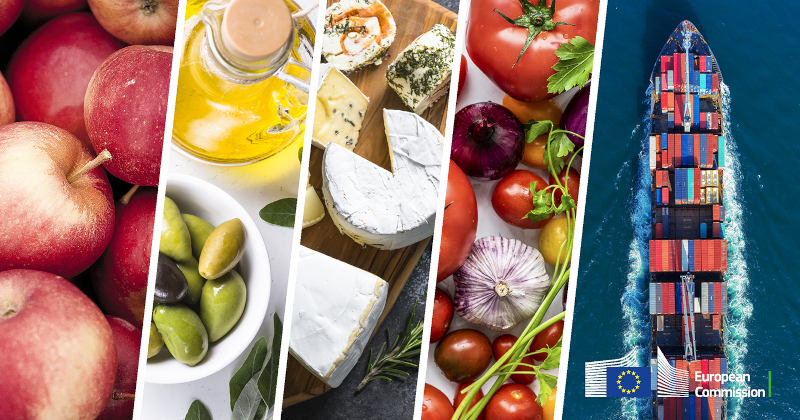
In January 2024, exports reached €18.4 billion that month, partly due to increased prices of olives, olive oil, and cereal preparations. Imports were worth €13.4 billion. As a result, the EU agri-food trade surplus reached €5 billion, a 27% increase from January 2023. These are the main findings of the latest monthly agri-food trade report published today by the European Commission.
Exports
The €18.4 billion of export value reached in January 2024 represents a 2% increase compared to January 2023.
The top three destinations for EU agri-food exports in January 2024 remained the United Kingdom (UK), the United States (US), and China. The UK accounted for 23% of export value and witnessed the largest increase in EU exports compared to January 2023 (+€304 million, +8%). Exports to the US saw a 9% increase compared to January 2023 (+€179 million). On the other hand, EU exports to China decreased by 11% (‑€141 million).
In terms of exported products, EU exports of olives and olive oil increased significantly in value compared to January 2023 (+€175 million, +146%), with mixed food preparations and ingredients also seeing a 10% increase. Compared to January 2023, sugar and isoglucose exports also saw a 152% increase in volumes, mainly in white sugar. Furthermore, cereal exports increased in volume and value, while vegetable oil exports decreased by 43% and dairy products exports decreased by 7%. Despite these changes, dairy products remain the second most exported product category.
Imports
In January 2024, EU agri-food imports reached €13.4 billion in January, marking a 10% increase in value from the previous month, but still -5% below January 2023 due to reduced prices across product categories.
Brazil remained the EU’s top source, accounting for 10% of total imports, with a small increase of €23 million (+2%). Ukraine followed, accounting for 10%, despite a 2% reduction in import value compared to January 2023. Finally, the UK also contributed 10%, despite a reduction of ‑€57 million (‑5%).
In terms of imported products, olives and olive oil imports increased by €80 million (+168%) while cereal imports declined by -34% (‑€472 million). Cocoa product imports also increased, while oilseeds, protein crops, and vegetable oils decreased.
More insights as well as detailed tables are available below in the latest edition of the monthly EU agri-food trade report.
Details
- Publication date
- 25 April 2024
- Author
- Directorate-General for Agriculture and Rural Development
- Location
- Brussels
